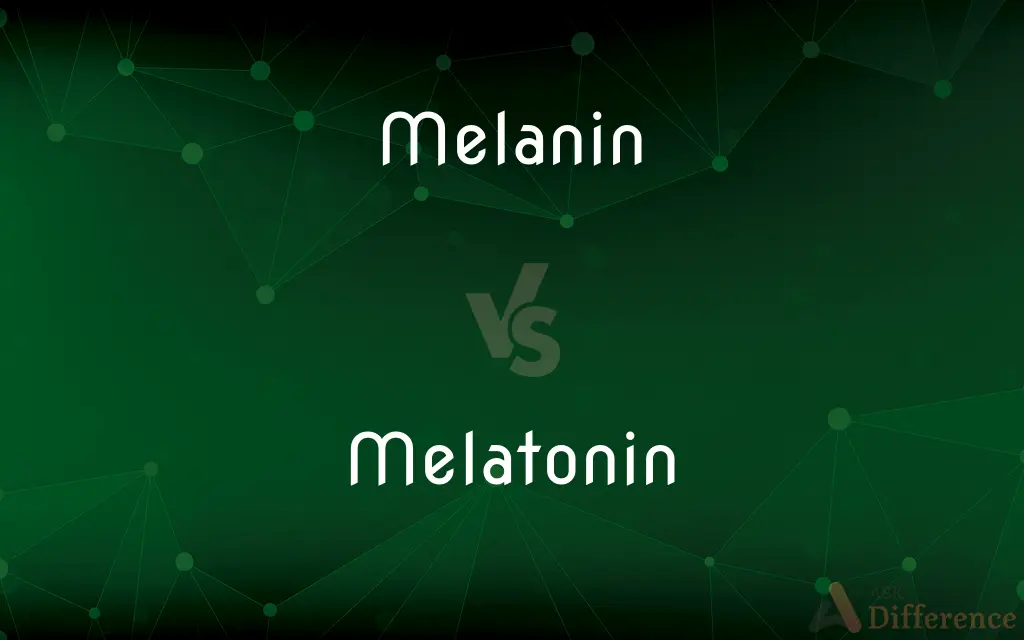Melanin vs. Melatonin — What's the Difference?
Edited by Tayyaba Rehman — By Fiza Rafique — Updated on September 26, 2023
Melanin is pigment produced by melanocytes in the skin, hair, and eyes that determines color and provides protection against UV radiation. Melatonin is hormone produced by the pineal gland in the brain that regulates sleep-wake cycles and is influenced b

Difference Between Melanin and Melatonin
Table of Contents
ADVERTISEMENT
Key Differences
Melanin: Melanin is a pigment, a natural substance responsible for skin, hair, and eye color. Melatonin: Melatonin is a hormone, a chemical messenger that regulates various bodily functions, including sleep patterns.
Melanin: It is produced by specialized cells called melanocytes primarily in the skin, hair follicles, and eyes. Melatonin: Melatonin is synthesized in the pineal gland, a small gland located deep within the brain.
Melanin: Genetics and exposure to UV radiation are the primary factors influencing melanin production. Melatonin: Light exposure, particularly the absence of light at night, triggers the release of melatonin.
Compare with Definitions
Melanin
Determines eye color, with higher melanin levels resulting in darker irises.
Melatonin
Melatonin supplements may aid in managing sleep disorders like insomnia.
ADVERTISEMENT
Melanin
Influences hair color, as reduced melanin production leads to graying hair.
Melatonin
Helps maintain circadian rhythms, synchronizing the body's internal clock.
Melanin
A natural pigment responsible for skin color, melanin shields the skin from harmful UV rays.
Melatonin
Its role in sleep quality makes melatonin a focus of sleep research.
Melanin
Genetic variations in melanin production contribute to diverse skin tones.
Melatonin
A hormone that regulates sleep, melatonin levels rise in darkness, inducing drowsiness.
Melanin
Protects against sunburn by absorbing and dissipating UV radiation.
Melatonin
Melatonin is a hormone primarily released by the pineal gland at night, and has long been associated with control of the sleep–wake cycle. As a dietary supplement, it is often used for the short-term treatment of insomnia, such as from jet lag or shift work, and is typically taken orally.
Melanin
Melanin ( (listen); from Greek: μέλας melas, "black, dark") is a broad term for a group of natural pigments found in most organisms. Melanin is produced through a multistage chemical process known as melanogenesis, where the oxidation of the amino acid tyrosine is followed by polymerization.
Melatonin
A hormone secreted by the pineal gland which inhibits melanin formation and is thought to be concerned with regulating the reproductive cycle.
Melanin
A dark brown to black pigment occurring in the hair, skin, and iris of the eye in people and animals. It is responsible for tanning of skin exposed to sunlight.
Melatonin
An animal hormone, C13H16N2O2, derived from serotonin and produced by the pineal gland. It stimulates color change in the skin of amphibians and reptiles and plays a role in regulating circadian rhythms and reproductive cycles in mammals. It is also found in plants and fungi.
Melanin
Any of a group of naturally occurring dark pigments, especially the pigment found in skin, hair, fur, and feathers.
Melatonin
A hormone, related to serotonin, that is secreted by the pineal gland, and stimulates colour change in the skin of reptiles, and is involved in the sleep/wake and reproductive cycles in mammals.
Melanin
(biochemistry) Any of a group of naturally occurring dark pigments, especially the pigment found in skin, hair, fur, and feathers.
Melatonin
Any material similar in its chemistry and effect to the natural hormone.
Melanin
A black pigment found in the pigment-bearing cells of the skin (particularly in the skin of the negro), in the epithelial cells of the external layer of the retina (then called fuscin), in the outer layer of the choroid, and elsewhere. It is supposed to be derived from the decomposition of hemoglobin.
Melatonin
A hormone secreted by the pineal gland. Chemically it is N-acety-5-methoxytryptamine. Research has indicated that there are daily rhythms in secretion of melatonin, in particular due to the depressing effect on melatonin production by light received by the retina. Conversely it appears that melatonin may influence the circadian rhythms of animals. There is some experimental evidence that administration of melatonin may increase the amount of sleep in people with sleep disorders. However, the evidence is not convincing and the effect is not profound. Nevertheless, the deregulation of melatonin and its availability over-the-counter has led to many people taking melatonin to help sleep, without consulting a physician.
A role for melatonin in sleep facilitation has been inferred from its effect on electroencephalogram patterns, but it has not been possible to demonstrate that wakefulness sleep cycles are driven by periodic accumulation, depletion, or regeneration of melatonin.
Melanin
Insoluble pigments that account for the color of e.g. skin and scales and feathers
Melatonin
Hormone secreted by the pineal gland
Melatonin
Affected by light exposure, melatonin secretion peaks during nighttime darkness.
Common Curiosities
What is the significance of melanin in different skin tones?
Melanin levels and distribution contribute to variations in skin colors among individuals and populations.
What is melanin's primary role in the body?
Melanin primarily determines skin, hair, and eye color.
How does melanin protect against UV radiation?
Melanin absorbs and disperses UV rays, reducing the risk of DNA damage and sunburn.
Are there health conditions related to melanin production?
Conditions like vitiligo involve a loss of melanin, resulting in depigmented patches on the skin.
How does light exposure affect melatonin production?
Exposure to light, especially blue light, suppresses melatonin production, making it harder to fall asleep.
Can melanin levels change over time?
Yes, factors like sun exposure and genetics can influence melanin production and distribution.
What is melatonin's role in sleep regulation?
Melatonin helps signal the body when it's time to sleep and wake, aligning with the circadian rhythm.
Can melatonin supplements treat insomnia?
Melatonin supplements are used to manage sleep disorders and jet lag, but their effectiveness varies.
What is the pineal gland's role in melatonin production?
The pineal gland in the brain synthesizes and releases melatonin in response to light cues.
Are there natural ways to boost melatonin levels?
Maintaining a regular sleep schedule, reducing exposure to screens before bedtime, and keeping the sleeping environment dark can help increase melatonin production naturally.
Share Your Discovery

Previous Comparison
Coefficient vs. Subscript
Next Comparison
Badass vs. BadAuthor Spotlight
Written by
Fiza RafiqueFiza Rafique is a skilled content writer at AskDifference.com, where she meticulously refines and enhances written pieces. Drawing from her vast editorial expertise, Fiza ensures clarity, accuracy, and precision in every article. Passionate about language, she continually seeks to elevate the quality of content for readers worldwide.
Edited by
Tayyaba RehmanTayyaba Rehman is a distinguished writer, currently serving as a primary contributor to askdifference.com. As a researcher in semantics and etymology, Tayyaba's passion for the complexity of languages and their distinctions has found a perfect home on the platform. Tayyaba delves into the intricacies of language, distinguishing between commonly confused words and phrases, thereby providing clarity for readers worldwide.














































